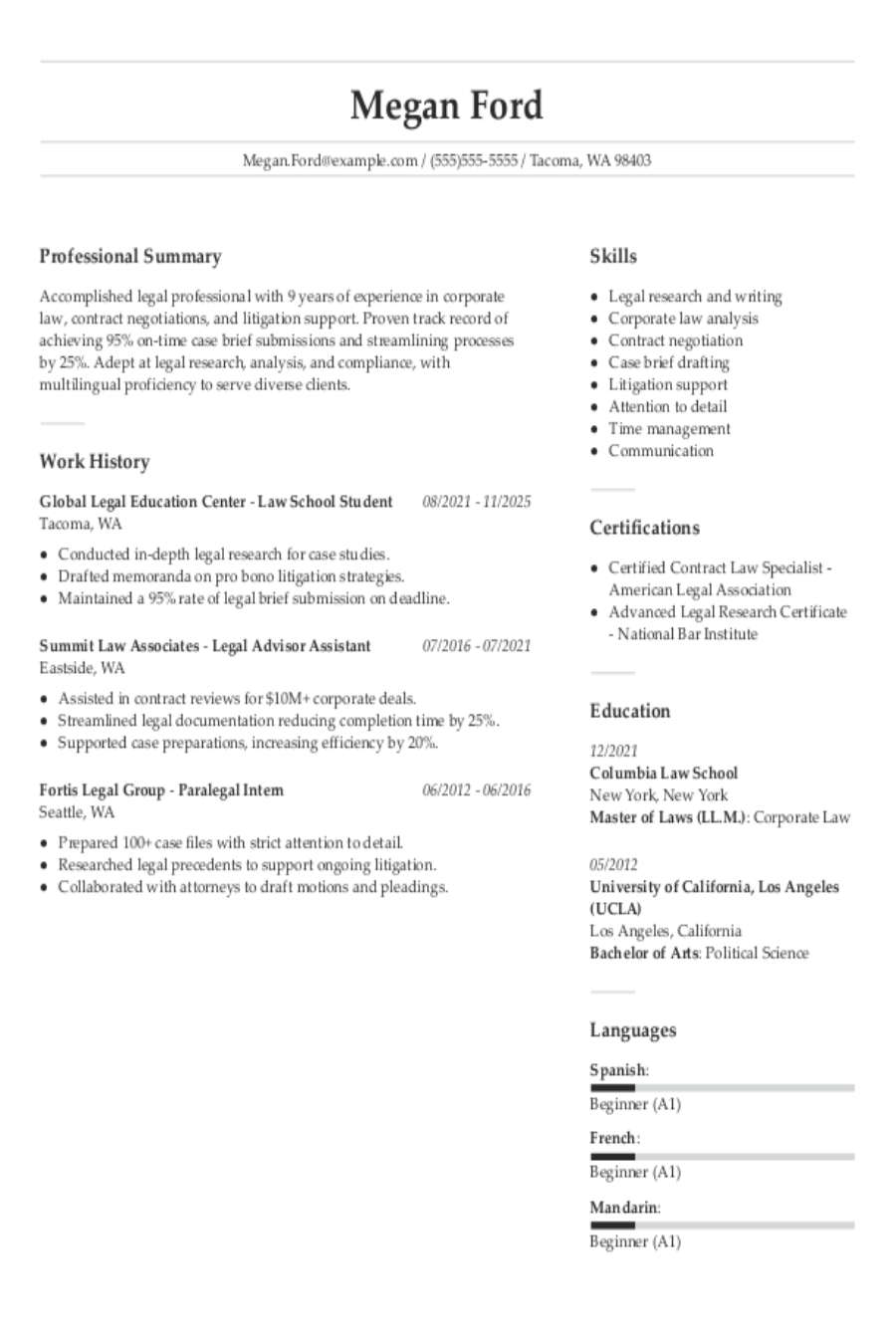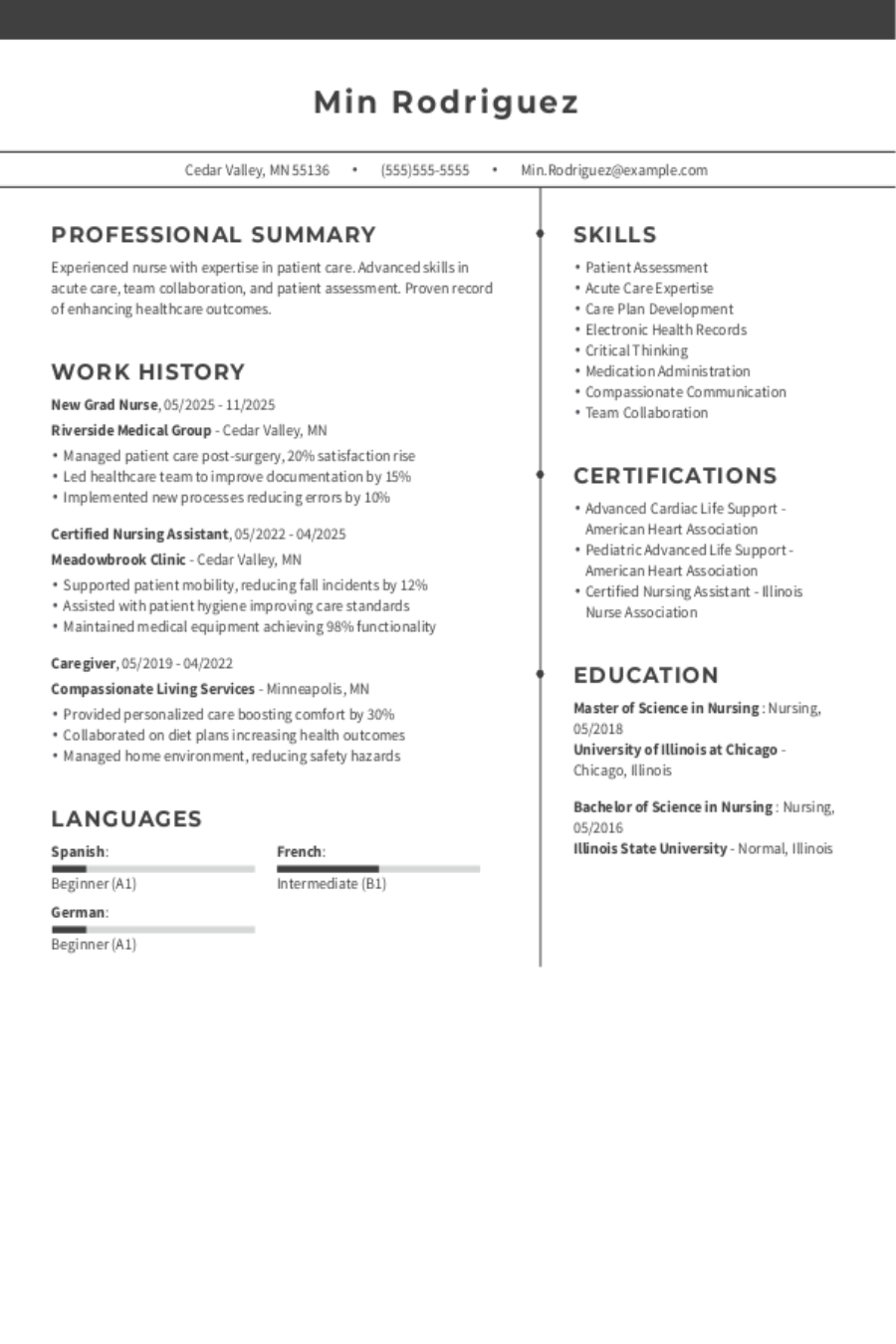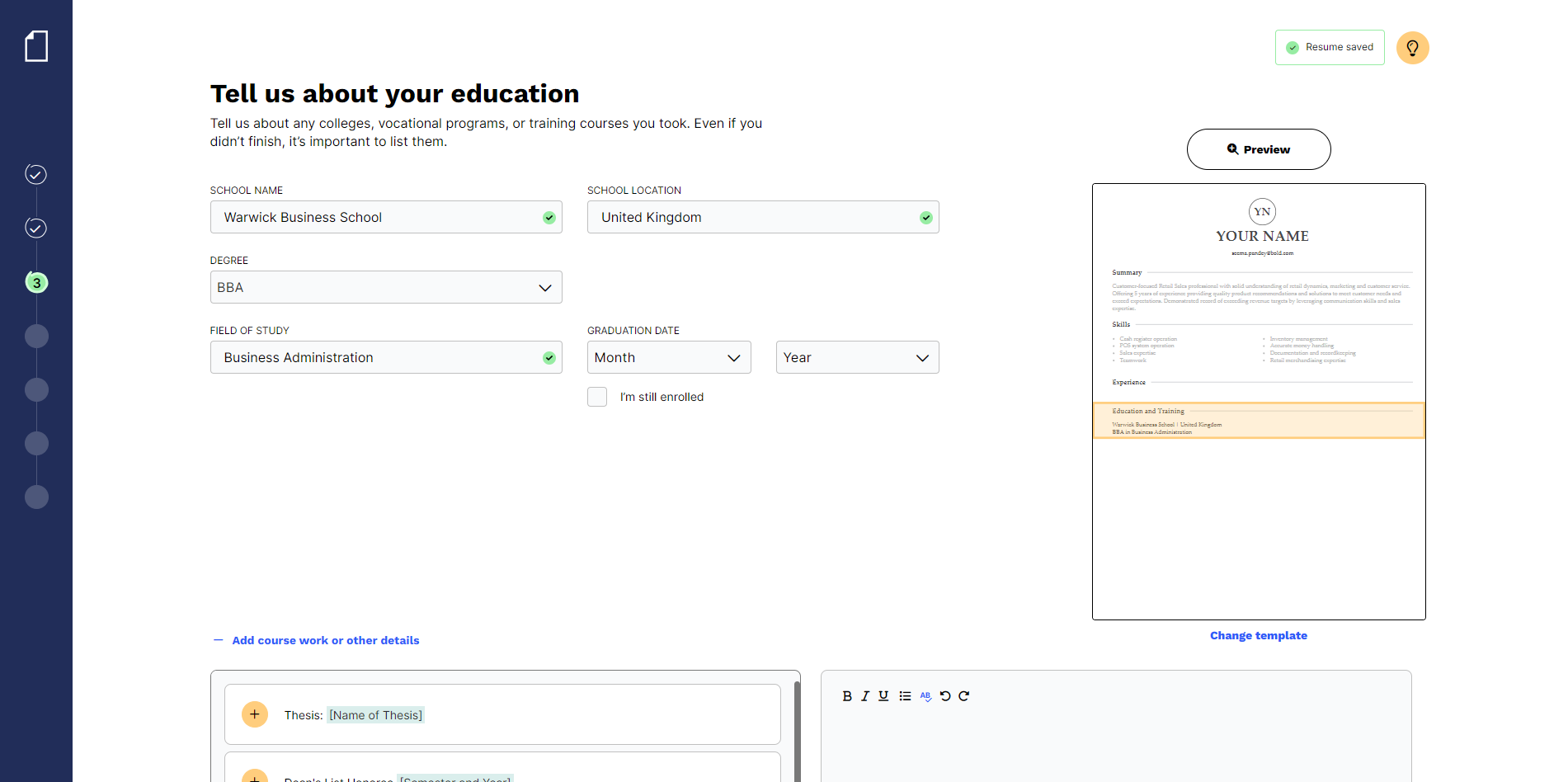Although it may seem like it needs little attention, the education section of your resume plays a significant role in making sure you clearly communicate your qualifications to the hiring manager.
Without it, many employers may disregard your application!
This means you need to make sure you correctly list your education on your resume, but how?
In this guide you will learn:
- How to write the education section of your resume.
- How to list your ongoing education if you’re still in college.
- Where to place your education section and what to include.
- Tips for formatting your education section.
- Examples to provide a template for writing the education section.
Want to land your dream job faster? Create a professional resume in minutes with our AI Resume Builder. Choose from customizable templates and job-specific content suggestions for a resume that captures what you bring to the table — without the hassle. Start building your winning resume now!
How to Write the Resume Education Section in 3 Steps
When you learn how to write your resume, you’ll quickly find that education is a standard component. Like your professional summary or resume statement, job history, and skills sections, how you present your education history is based on your background.
The education section is particularly important for entry-level job seekers who need to make a resume without work experience. Education is a way to showcase knowledge and skills before they’ve been tested in the workplace.
With that in mind, here are three things to do when you write this part of your resume.
1. Put your education section in the right spot
Placing your education section in the right spot on your resume is important.
The main factor is how long you’ve been in the job market.
If you’ve been working for several years, employers will be more interested in your work experience instead of your education. In which case, your education should go below your professional history.
Here’s an example of a chronological resume that minimizes the education section (a combination resume would work just as well):
Now, if you’re a recent graduate or entering the workforce for the first time, your education section should take priority over work experience because you simply don’t have many professional achievements to highlight.
Here’s a functional resume in which professional experience takes a backseat to education:
See our resume templates for more examples of education on a resume, and check out our guide on resume formats for more insight into how resumes can be structured.
2. Include the right details about your education
The education section should focus on high-level information about your educational history. You don’t want to overwhelm the reader with irrelevant details like specific classes or extracurricular activities unrelated to the job.
Here are the factors you must include in your resume education section:
- Name and location of the school.
- Years attended or year of graduation.
- The degree you obtained (if applicable).
Those are the basics, but there are many optional sections to consider, like the following:
- Field of study.
- GPA (if it is above a 3.5 and you have limited work experience).
- Honors and achievements.
- Notable coursework.
- Relevant extracurricular activities.
Please note that the above options should only be considered if they are relevant to the job.
The final step to completing an excellent education section is formatting.
3. Format your education correctly
Making sure your education section is properly formatted is just as important as the contents. After all, a poorly-formatted section could be unreadable or — even worse — mislead the employer.
The key is to keep the section organized and concise and to use font stylings (bold and italics) to differentiate the information. (Our AI Resume Builder can help with this.)
Here’s one example of ideal formatting:
EDUCATION
Moore College of Art and Design, Philadelphia, PA
Master of Arts in Education (M.A.), May 2022
Notice how the school and location are highlighted in bold, while the degree and completion date are in italics.
Here’s a candidate with a similar educational background. See how they use bullet points to emphasize notable awards:
EDUCATION
Master of Arts in Education, May 2024
Moore College of Art and Design, Philadelphia, PA
Recognition:
- Professional Development Fellowship Award
- Union League Civic and Arts Foundation Award
Bachelor of Visual Arts, May 2019
Rutgers University, New Brunswick, NJ
Recognition:
- Ralph DuCasse Studio Art Award
The second example flips the school and the degree, emphasizing the level of educational attainment rather than the institution. This example is also the lengthiest you’d want a resume’s education section to be. If you believe you need more space to fully account for your education, you may want to consider whether a CV would be a better choice.
Okay, let’s get more specific with education examples covering everything from listing a Ph.D. to highlighting incomplete coursework.
10+ Examples of Listing Education on Your Resume
Listing your education properly depends on many factors, including your level of education, when you finished your studies, and whether you have academic accomplishments you’d like to mention.
Find your particular education situation among the examples below.
How to list high school education on your resume
A high school diploma is an easy addition to a resume. Simply list your school name and location, year of graduation, and the diploma you earned. Feel free to mention your GPA (if it’s over 3.5) and clubs or organizations you participated in — especially if they’re relevant to your target position.
Pro Tip: Don’t list your high school diploma on your resume if you went on to get an advanced degree.
High school education examples
EDUCATION
High School Diploma
Cleveland High School, Seattle, WA
Graduated: May 2023
GPA: 3.9/4.0
or
Fleming Island High School, Orange Park, FL
High School Diploma
Expected graduation: May 2025
GPA: 3.7/4.0
Pro Tip: If you’re listing a GED on your resume, there’s no need to include your incomplete high school education.
What if you have a GED?
Employers count a General Education Development Certificate (GED) as an educational equivalent to a high school diploma. The same could be said for similar certificates, like the High School Equivalency Diploma (HiSET) and the California High School Equivalency Certificate.
GEDs and HiSETs should be listed on your resume unless you’ve completed higher education. If you have a college degree or you’ve completed some college, there’s no need to mention your GED.
If you’re working toward a GED, let the employer know by including “in progress” or “expected completion date: [insert month and year]” next to the certificate.
Okay, here’s an example of what a GED section should look like:
EDUCATION
General Education Development Certificate (GED)
Pro Tip:If you’re listing a GED on your resume, there’s no need to include your incomplete high school education.
How to list undergraduate education on your resume
Listing your higher education is crucial because it tells employers whether you are adequately trained in your field and have the right knowledge base. When jobs require an advanced degree, employers check applicants’ educational backgrounds to see if they are qualified.
When listing your degrees, start with the most recent and work backward. If you have multiple undergraduate degrees, you’d start with your bachelor’s degree and then your associate degree (if applicable). There is no need to list your high school diploma in this case.
Pro Tip:When you have more than one major, only list the major that’s most relevant to the job you’re applying for.
Example for undergraduate education
Here’s an example for job seekers with an associate degree:
EDUCATION
Associate of Science in Health Information Technology
Indiana University Northwest, Gary, IN
Completed: May 2024
Dean’s List 2023-2024
Here’s an example for job seekers with a bachelor’s degree:
EDUCATION
University of Illinois Urbana-Champaign, Champaign, IL
Bachelor of Science in Electrical Engineering, May 2021
GPA: 3.8/4.0
Honors: Magna Cum Laude
How to list graduate education on your resume
If you have advanced degrees, list them from the highest rank down in reverse-chronological order. In other words, start with your most recent degree, then your next most recent degree until you finish your post-high school educational history. You may want to place your certificates and other coursework under separate headings.
Example for graduate students (master’s degree)
Start by listing your most advanced degree, then your previous degrees, such as a bachelor’s or associate. Here’s an example:
EDUCATION
Master of Business Administration
University of Notre Dame, Notre Dame, IN
Completed: 2024
Bachelor of Science in Business Administration
Purdue University, West Lafayette, IN
Completed: 2012
Example for doctorate students (Ph.D.s)
Job seekers who have a doctorate (Ph.D.) should include their dissertation or thesis alongside their diploma, especially if their dissertation is relevant to the job.
EDUCATION
Ph.D. in Geological Sciences
Arizona State University, Tempe, AZ
Graduated: May 2024
Dissertation: Temporal Factors in Coastal Erosion
Master of Science in Geological Sciences
Arizona State University, Tempe, AZ
Graduated: December 2018
Bachelor of Arts in Geology
Georgia Southern University, Statesboro, GA
Graduated: May 2016
Honors: Cum Laude
Pro Tip:By the way, if you’re applying for an academic position, you may want to use a CV. Check out our CV examples to get started.
How to put in-progress education on your resume
It’s perfectly acceptable to list in-progress studies on your resume. Include work you’ve completed, the degree you’re working toward, and when you expect to graduate.
In-progress education example
EDUCATION
Miles Community College
Miles City, MT
Associate of Applied Science (A.A.S.), Small Business Management (in progress)
Diploma expected May 2025
Relevant Coursework Completed:
- Business Law
- Management
- Interpersonal Communication
Words for describing ongoing education
You want to use the right wording for degrees that are in progress. Here are a few phrases hiring managers recognize:
- In progress
- Expected: [month and year]
- Expected completion: [month and year]
- Expected graduation: [month and year]
- Anticipated: [month and year]
If you’d like some help wording your education section, check out our AI Resume Builder. When you share a few basic details about your education, the section will be written and formatted for you.
How to list incomplete education on your resume
If you have some formal education but did not receive a degree, don’t worry; your education counts! List the name of the school and relevant coursework. Certifications, awards, training, and professional development courses or workshops will add weight to this section.
Pro Tip: Never attempt to explain incomplete education or unfinished degrees on your resume. You can always share some context in your cover letter.
Example for applicants with unfinished education
Incomplete education should always begin with the school name and list the dates you attended, like so:
EDUCATION
University of Wisconsin-Madison, January – August 2021
Completed coursework: Elements of Data Science, Essentials of Analytics, Statistics, Basics of Coding
or
EDUCATION
New York University, September 2023 – May 2024
Completed 28 credits in Social Sciences
Can you put certificates and training in the education section?
Yes! If you’re looking for work in a hands-on industry like a restaurant, construction, maintenance, beauty, or public service, use your education section to display your job-related certificates, licenses, and on-the-job training.
Certifications show an employer you have the hard and soft skills to perform the job. There are many courses available on all types of hard skills. Even soft skills, which are more challenging to learn in a classroom, can be conveyed by a certificate.
Here’s an example that lists training in the education section:
EDUCATION
IBEW Apprenticeship Program
Electrician’s Apprentice, August 2023
Boise Technical College
Licensed Journeyman Electrician, June 2022
Certificates:
- Certified Electrical Safety Technician
- SGS Electrical Installations Certification
- NTT Electrical Codes and Standards Certification
Should you ever cut education from your resume?
Education is an integral part of a resume, but there are situations where you’d be better off omitting information.
Here are two reasons to cut education from your resume:
- A high school diploma becomes irrelevant when you have college experience or professional certificates and training. While you may be asked if you graduated high school on the application, there’s no need to include it on your resume if you have more recent or advanced education.
- Certain courses you completed are no longer relevant. Technical skills change over time, and some of your earlier training and courses may need to be updated. If the coursework on your resume is dated, leave it off.
Resume Education Section FAQ
On your resume, create a section called “Education.” If you graduated within the last three years, place it above your work history section. Otherwise, put it below your work history. List schools attended (with dates) in reverse-chronological order and add essential information, such as diplomas or certificates earned and relevant courses taken, under each school.
You can also touch on your educational background in your cover letter, which should accompany your resume. We have cover letter examples to show you how to write a cover letter, as well as templates and guides to get you started.
You can also use our AI Cover Letter Generator to help you create one tailored just for you. Simply fill out your information, pick a template, and we will put together customizable content that matches your professional goals.
Do not include irrelevant information, such as courses that do not match the job or training that isn’t applicable.
Yes! Most employers count the GED as education equivalent to a high school diploma. No need to list it on your resume if you have completed a higher education program.
Was this information about How To Write Education Section On A Resume (With Examples) helpful? Let us know!
Don is a Certified Professional Resume Writer (CPRW) with more than 10 years’ experience creating digital content, including four years helping job seekers develop their careers. He holds an M.S. in Journalism from Northwestern University.
More resources

The AI Boss Effect: 97% of Workers Have Asked ChatGPT for Advice Instead of Their Manager
Resume Now s latest report explores how AI is replacing manage...

37 Unique Skills to Put on Your Resume
Trying to avoid the skills you see pop up on resumes repeatedl...

Resume Now Spotlights 14 High-Innovation, High-Growth Jobs That Pay $60K+
Resume Now s latest report highlights some of the highest payi...

Mechanical Engineering Resume: Examples & Templates
Build & download your Mechanical Engineering resume in a few s...

Law School Resume: Examples, Templates and Tips
Check out our resume examples for help getting your law school...

New Grad Nurse Resume: Examples & Templates for 2025
Build & download your New Grad Nurse resume in a few simple st...

